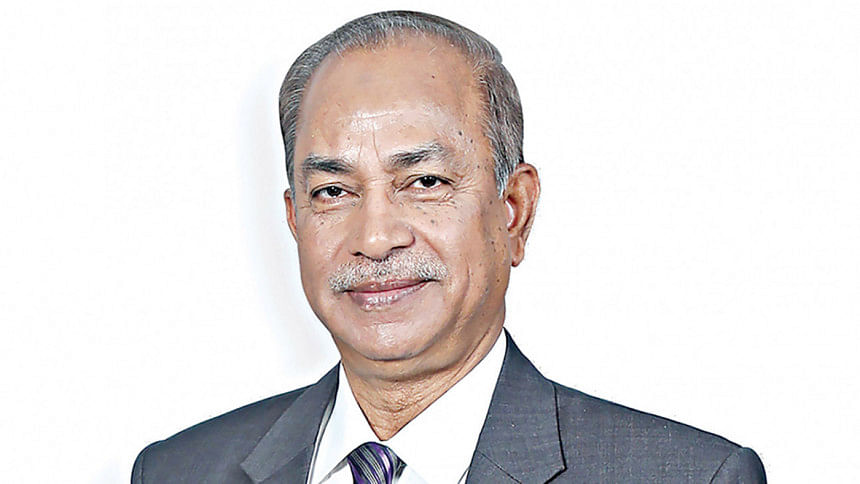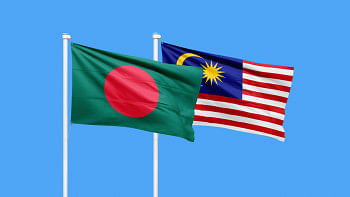Tribute by Mahfuz Anam: Major (retd) Muqtadir Ali, an unassuming patriot from the blessed generation

Death is always difficult to accept, but in the case of some, it is more so. The news of Major (retd) Muqtadir Ali passing away on August 20 not only shocked his family, but also all his freedom fighter colleagues, second war course batchmates, professional colleagues in the energy sector, and personal friends and relatives. It was so because he was in such robust health and was an example to us of healthy living. His brain stroke proved to be fatal. In a matter of a few hours, we lost a dear friend, the freedom fighters a proud example, the energy sector a well-known professional, and the country an ideal citizen who worked relentlessly for its betterment. He was courteous to the core, the first to volunteer for a collective cause, always exuding human qualities and ever ready to extend a helping hand to whosoever needing it. Modesty was his trademark.
It was a motley group that had gathered at Murti, a temporary training camp in the mountainous part of northern Jalpaiguri, India, for the training of the second batch of commissioned officer cadets for the Bangladesh army to serve our Liberation War.
There were about 70 of us, of various ages and educational and social backgrounds. As we gathered for our first fall-in, in the early hours of an October morning, I looked around at all these unknown faces—recognising only three—and realised that these comrades in arms were all the family I had, for God knows how long? Suddenly, all these unfamiliar faces' fates seemed to have been blended into mine and magically made one.
They were all filled with a youthful and dreamy determination to fight for the country now under Pakistani occupation. We all had an unspoken sense of being a part of a far bigger historical force, of something grand and noble and beautiful. During our first break, we started talking and getting to know each other.
There was one youthful face, full of earnestness, sincerity and grace that naturally drew me towards him. This was the first time that I met Muqtadir Ali, soon to become one of my constant sources of warmth, support and friendship. We exchanged personal information, and unbeknownst to us, a bond was forming and the seeds of a life-long friendship were being sown. Every day, through our physical training, theoretical classes, evening games, long night patrols and modest meals, our friendship grew.
Muqtadir was an ideal officer cadet—disciplined, sharp, eager, energetic, agile and mentally strong. He was often the first one to answer questions by the training instructors and the one to rigorously engage them on issues of formulating strategies and tactics, whose rudimentary levels we were being taught.
There was a special dynamic among the 70 of us who, by some unknown and unfathomable stroke of fortune, had been thrown together. We realised that for the foreseeable future, our whole world consisted of just us—this diverse group of freedom fighters, most of whom we did not know till the day we came together at the Murti camp. Our Liberation struggle was that unique moment in history that brought us together, our love for our motherland was that magical bond that held us together, and our firm belief in the independence of Bangladesh was the dream that strengthened us, in every moment of the time that we spent together.
It was often that we felt anxious and worried about our parents and loved ones that we left home. There were many occasions where we would huddle together and talk about the atrocities that we had ourselves witnessed. Muqtadir's was a very meaningful and powerful presence for us in those occasions. He would drive away our sorrows with his optimism, his ardent hope about the future and his steely determination about our purpose. All this had a magical impact on our psychology and strengthened our motivation to carry on, whose frequent author was Muqtadir.
Within a short time, I became close to Muqtadir, who showed most of the virtues that make for an ideal freedom fighter. I learnt about his personal life, his family and especially about what he did before he joined the Murti camp. He joined the Liberation War in May and after some initial training, joined Major CR Datta's operation in what later became Sector 4. His extraordinary valour and readiness to engage the enemy earned him great respect from his compatriots, which later resulted in his nomination for the Murti training to be an officer in the Bangladesh army. In everything he did, he exuded confidence, commitment, determination, a single-minded sense of purpose and a spirit of sacrifice that would make him, later in his life, an exceptional professional in the service of his country. In the future, he would be a part of that committed group who would work tirelessly to build Bangladesh after independence.
After independence, we parted ways. On returning from Murti in February 1972, I resigned from the army and re-joined my studies at Dhaka University, and later entered journalism.
It was really after I co-founded The Daily Star in January 1991 that my friendship with Muqtadir began anew. By this time, he was a well-known professional and had for years worked at Titas Gas Company, of which he later became Managing Director. He also became the chairman of Petro Bangla and chairman of the Petroleum Corporation of Bangladesh. He retired as an additional secretary of the government in 2012 and served the private sector in various advisory capacities.
His long involvement in the gas sector earned him respect from experts. He devoted himself to learning more and more about the vital energy sector, thus receiving laurels from his contemporaries.
His role as the founding secretary general of the Bangladesh War Course Foundation (BWCF), an organisation of all the participants in the first and second war courses at Murti, was most exemplary. His energy, discipline, commitment and care for the foundation got us off to a great start. Subsequently, he held various executive posts, in all of which his performance was unmatched. In fact, for those of us who were not such regular members, Muqtadir was the person who would constantly strive to get us more involved. Thus, for any activity of the foundation, I could count on his unfailing effort to move us forward.
In his passing, we have lost another freedom fighter and a patriot. Several such brave and committed freedom fighters left us during these trying times. Due to the pandemic, we couldn't observe their passing in the appropriate manner that they so richly deserved. But we must remember that with the passing of each of them, we are losing members of that blessed generation who had the honour and the privilege of being personally involved with that glorious moment in our history that gave us an independent country, where we can live in freedom.
My tribute to each and every one of them for their unique roles in 1971—roles that were a blend of youthful energy, courage, sacrifice, love and a beautiful dream of freedom and a life of dignity. Muqtadir, who personally touched so many of us in so many splendid ways, personified all these qualities in a magnificent way.
Mahfuz Anam is Editor and Publisher, The Daily Star.

 For all latest news, follow The Daily Star's Google News channel.
For all latest news, follow The Daily Star's Google News channel. 



Comments